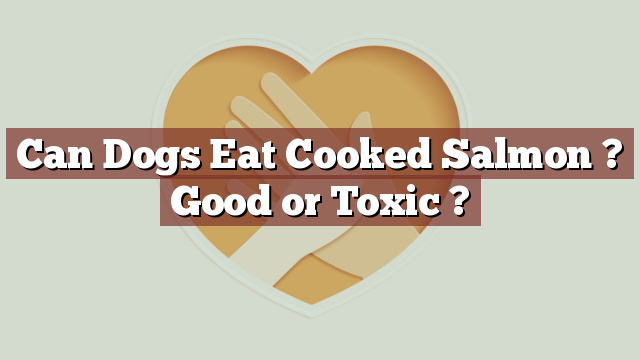Can Dogs Eat Cooked Salmon? Good or Toxic?
Knowing the safe foods for our pets is of utmost importance to ensure their health and well-being. Among the many questions about what dogs can and cannot eat, one that often arises is whether cooked salmon is safe for them. In this article, we will explore the nutritional value of cooked salmon for dogs, determine if it is safe or toxic, discuss the potential risks and benefits, and provide guidance on what to do if your dog consumes cooked salmon.
Nutritional Value of Cooked Salmon for Dogs
Cooked salmon is a rich source of essential nutrients that can benefit the overall health of dogs. It is packed with high-quality protein, omega-3 fatty acids, vitamins D and B12, and minerals like selenium and potassium. These nutrients play a vital role in maintaining a healthy coat, promoting brain health, supporting a strong immune system, and improving cardiovascular health in dogs.
Is Cooked Salmon Safe or Toxic for Dogs?
Yes, dogs can safely consume cooked salmon as long as it is prepared properly and fed in moderation. However, there are a few important considerations to keep in mind. Firstly, salmon should always be cooked thoroughly to eliminate the risk of bacterial contamination, which can cause digestive issues in dogs. Secondly, it is crucial to remove any bones from the salmon before feeding it to your dog, as they pose a choking hazard and can damage the digestive tract.
It is worth noting that raw or undercooked salmon should never be given to dogs. Raw salmon can contain parasites and harmful bacteria, such as salmonella, which can lead to severe illness. Therefore, it is essential to cook the salmon thoroughly to ensure its safety for your furry friend.
Potential Risks and Benefits of Dogs Eating Cooked Salmon
When fed in moderation and properly prepared, cooked salmon can offer several health benefits to dogs. The omega-3 fatty acids found in salmon can help reduce inflammation, improve joint health, and promote a healthy skin and coat. These fatty acids can also support brain development and cognitive function, especially in puppies and senior dogs.
However, it is crucial to be aware of the potential risks associated with feeding cooked salmon to dogs. Salmon can sometimes contain small bones that have the potential to cause choking or intestinal blockage. Therefore, it is important to be cautious and remove all bones before serving cooked salmon to your dog. Additionally, as with any new food, some dogs may be allergic to salmon. It is important to monitor your dog for any signs of an allergic reaction, such as itching, swelling, or gastrointestinal distress.
What to Do If Your Dog Eats Cooked Salmon
If your dog accidentally consumes cooked salmon, there are a few steps you can take to ensure their well-being. Firstly, remain calm and assess the situation. If the salmon was properly cooked and without bones, the risk of immediate harm is minimal. However, if your dog ingested salmon bones or shows signs of an allergic reaction, it is crucial to seek veterinary assistance promptly. The vet will be able to evaluate your dog’s condition and provide appropriate guidance or treatment if necessary.
Conclusion: Cooked Salmon Can Be Beneficial for Dogs in Moderation
In conclusion, cooked salmon can be a beneficial addition to a dog’s diet when prepared and served correctly. It provides essential nutrients, such as protein, omega-3 fatty acids, and vitamins, that promote overall health and well-being. However, it is important to ensure the salmon is thoroughly cooked, bone-free, and fed in moderation. Always monitor your dog for any adverse reactions or symptoms and consult a veterinarian if you have any concerns or questions regarding your dog’s diet. By following these guidelines, you can safely incorporate cooked salmon into your dog’s diet and provide them with a nutritious and delicious treat.
Thank you for investing your time in exploring [page_title] on Can-Eat.org. Our goal is to provide readers like you with thorough and reliable information about various dietary topics. Each article, including [page_title], stems from diligent research and a passion for understanding the nuances of our food choices. We believe that knowledge is a vital step towards making informed and healthy decisions. However, while "[page_title]" sheds light on its specific topic, it's crucial to remember that everyone's body reacts differently to foods and dietary changes. What might be beneficial for one person could have different effects on another. Before you consider integrating suggestions or insights from "[page_title]" into your diet, it's always wise to consult with a nutritionist or healthcare professional. Their specialized knowledge ensures that you're making choices best suited to your individual health needs. As you navigate [page_title], be mindful of potential allergies, intolerances, or unique dietary requirements you may have. No singular article can capture the vast diversity of human health, and individualized guidance is invaluable. The content provided in [page_title] serves as a general guide. It is not, by any means, a substitute for personalized medical or nutritional advice. Your health should always be the top priority, and professional guidance is the best path forward. In your journey towards a balanced and nutritious lifestyle, we hope that [page_title] serves as a helpful stepping stone. Remember, informed decisions lead to healthier outcomes. Thank you for trusting Can-Eat.org. Continue exploring, learning, and prioritizing your health. Cheers to a well-informed and healthier future!

